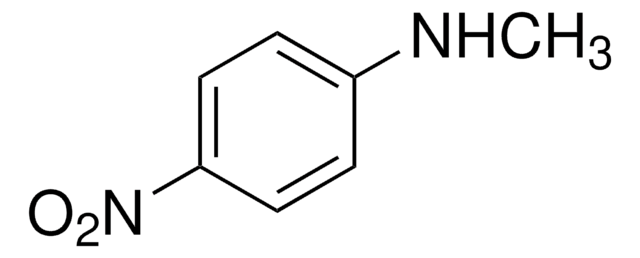157171
2-Nitrodiphenylamine
98%
Synonym(s):
2-Nitro-N-phenylaniline
Sign Into View Organizational & Contract Pricing
All Photos(1)
About This Item
Linear Formula:
C6H5NHC6H4NO2
CAS Number:
Molecular Weight:
214.22
Beilstein:
2213591
EC Number:
MDL number:
UNSPSC Code:
12352100
PubChem Substance ID:
Recommended Products
vapor density
10.7 (vs air)
Assay
98%
mp
74-76 °C (lit.)
SMILES string
[O-][N+](=O)c1ccccc1Nc2ccccc2
InChI
1S/C12H10N2O2/c15-14(16)12-9-5-4-8-11(12)13-10-6-2-1-3-7-10/h1-9,13H
InChI key
RUKISNQKOIKZGT-UHFFFAOYSA-N
General description
2-Nitrodiphenylamine is a double-base (DB) rocket propellant stabilizer and its microencapsulation potentially improves the shelf life of DB rocket propellants. It is one of the component of Otto Fuel II, a propellant in torpedoes. Solubilization of 2-nitrodiphenylamine, a hydrophobic polar dye molecule, in aqueous solutions of polystyrene(310)-b-poly(acrylic acid) micelles was investigated.
Signal Word
Warning
Hazard Statements
Precautionary Statements
Hazard Classifications
Eye Irrit. 2 - Skin Irrit. 2 - STOT SE 3
Target Organs
Respiratory system
Storage Class Code
11 - Combustible Solids
WGK
WGK 3
Flash Point(F)
Not applicable
Flash Point(C)
Not applicable
Personal Protective Equipment
dust mask type N95 (US), Eyeshields, Gloves
Choose from one of the most recent versions:
Already Own This Product?
Find documentation for the products that you have recently purchased in the Document Library.
Marvin Shorty et al.
Journal of microencapsulation, 29(6), 569-575 (2012-08-24)
We demonstrate the microencapsulation of a double-base (DB) rocket propellant stabiliser, 2-nitrodiphenylamine (2-NDPA), that can potentially increase the shelf life of DB rocket propellants. Poly(lactide-co-glycolide) (PLG) microspheres loaded with 2-NDPA were prepared using the oil-in-water emulsion technique. The microsphere size
Amira Choucair et al.
Journal of the American Chemical Society, 125(39), 11993-12000 (2003-09-25)
We investigate the solubilization of 2-nitrodiphenylamine, a hydrophobic but polar dye molecule, in aqueous solutions of polystyrene(310)-b-poly(acrylic acid)(47) micelles. The solubilization capacity of the micelles, which consist of a polystyrene core and poly(acrylic acid) corona, and the micelle-water partition coefficient
Simon Kern et al.
Analytical and bioanalytical chemistry, 410(14), 3349-3360 (2018-04-05)
Monitoring specific chemical properties is the key to chemical process control. Today, mainly optical online methods are applied, which require time- and cost-intensive calibration effort. NMR spectroscopy, with its advantage being a direct comparison method without need for calibration, has
Djaafar Siddiq Karahacane et al.
Forensic science international, 301, 129-136 (2019-06-04)
The detection and analysis of gunshot residues expelled during the discharge of the weapon play a potential role in criminal investigations. In this work, organic gunshot residues produced by using automatic rifle Kalashnikov caliber: 7.62×39mm and semi-automatic pistol Makarov caliber:
S Powell et al.
Anaerobe, 4(2), 95-102 (2006-08-05)
Otto Fuel II, a propellant in torpedoes, is composed of 76% 1,2 propanediol dinitrate (PGDN), 22.5% di-n-butyl sebacate, and 1.5% 2-nitrodiphenylamine (NDPA), and is largely recalcitrant to aerobic microbial degradation. Anaerobic microbial degradation of Otto Fuel II was tested by
Our team of scientists has experience in all areas of research including Life Science, Material Science, Chemical Synthesis, Chromatography, Analytical and many others.
Contact Technical Service









